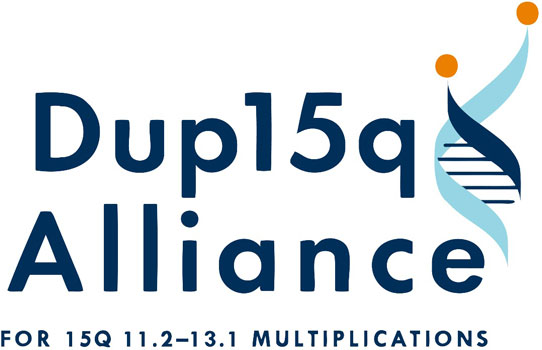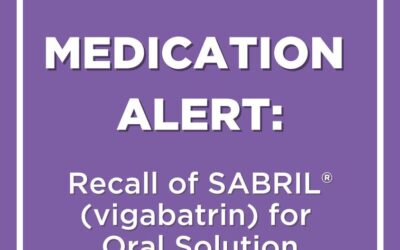Our friends at the Tuberous Sclerosis Alliance share Important news regarding changes to access and availability of everolimus, a drug used to treat several conditions including certain types of seizures.

Important news regarding changes to access and availability of everolimus, a drug used to treat several conditions associated with tuberous sclerosis complex (TSC) such as subependymal giant cell astrocytomas (SEGAs), kidney angiomyolipomas (AMLs) and certain types of seizures. Individuals with TSC may also use everolimus to treat other clinical manifestations of the disease. Until now, only the drug company Novartis exclusively made everolimus, which is sold under the brand name of Afinitor®. Afinitor is available both as tablets in strengths of 2.5 mg, 5 mg, 7.5 mg and 10 mg meant to be taken whole and as Afinitor Disperz®, which comes as 2 mg, 3 mg and 5 mg tablets to be taken after being dissolved in water. The Disperz type is most commonly used for seizures.
Beginning in December 2019, a second drug company called PAR Pharmaceuticals was given permission from the United States Food and Drug Administration (FDA) to manufacture and sell a generic form of everolimus.
- Effective immediately, the 2.5 mg, 5 mg and 7.5 mg regular tablets will be available from BOTH Novartis and PAR Pharmaceuticals.
- The 10 mg tablets will only be available from Novartis for the time being.
- All strengths of Afinitor Disperz will only be available from Novartis at this time.
We hope this email will explain how having everolimus tablets made from two different drug companies may impact your current everolimus treatment and answer some basic questions you may have about this change.
First, how will you know if you are still able to get the Afinitor brand or will be switching over to the generic everolimus from PAR Pharmaceuticals?
- To a certain extent, this decision will be determined by your insurance company.
- Some plans will choose to have Afinitor as the preferred version on their formularies while others will choose the generic everolimus.
We recognize this may create confusion for patients who need to take doses greater than 10 mg, which requires taking two pills of different strengths to make up the total dose.
- For example, patients needing 12.5 mg may currently take one 10 mg combined with a 2.5 mg tablet.
- Or patients who need 15 mg may take a 10 mg tablet with a 5 mg one.
The 10 mg tablets will only be available as the Afinitor brand.
- It is not recommended that one portion of your total dose come as Afinitor and the other portion come as a generic.
- If your insurance plan only supports the generic version, you may need to change the combination of tablets you take to determine your final dose. For example, patients who need 15 mg may be required to take two of the 7.5 mg tablets of generic everolimus to avoid combining 10 mg Afinitor and 5 mg genetic tablets, which is not recommended.
Your doctor or healthcare provider may have to change your prescription to accommodate these new combinations.
Next, how will you know if there is a difference in how well the generic everolimus works compared to the Afinitor brand?
- The most common way your doctor or healthcare provider knows you are taking the correct dose is by measuring the level of everolimus in your blood.
- You also know the dose is right because you are not having more side effects like mouth ulcers compared to what you were experiencing with Afinitor.
It is possible your level might change when switching from the brand name to the generic.
- Your level may go up or it may go down, and it will be hard to predict how it will change until you try the new formulation for a few weeks.
While both Afinitor and generic everolimus have the same amount of everolimus in the corresponding doses (ie, 5 mg tablet of Afinitor and a 5 mg tablet of the PAR Pharmaceuticals version both have 5 mg of everolimus), the major differences are all the other materials that go into making a tablet hold together as a “pill.” Each company may use a different combination of these other materials.
- These differences can change how quickly the tablets get broken down in your stomach and, therefore, how quickly the drug gets absorbed into your blood.
- If you experience increased or new side effects when you start taking the generic, or if you have long-standing side effects like mouth sores that go away after starting the generic, let your doctor or healthcare provider know as soon as possible.
Finally, if you need to transfer your prescription from Afinitor to generic everolimus, how can you prevent any delays in getting a refill and what will happen to patient assistance plans you already have in place?
- Everyone’s priority is for you to get your refills on time so you do not miss a dose.
- Missing even a few weeks of therapy puts you at risk for:
- Having new growth of your AMLs and/or SEGAs or worsening of seizures.
- Needing to re-start therapy at a lower dose and slowly work back up to your prior dose.
Your doctor or healthcare provider may have to submit a new Prior Authorization(a document that confirms the medical reasons you need the therapy; insurance companies need this on file before they agree to pay for expensive drugs like everolimus).
- The TS Alliance has drafted sample Prior Authorization letters your doctor can use as examples, which you can download below.
- These Prior Authorization letters can also be used if your doctor/healthcare provider feels you should stay on the brand-name Afinitor instead of changing to the generic everolimus.
- Download the Sample Prior Authorization Letter for AMLs
- Download the Sample Prior Authorization Letter for SEGAs
If you also benefit from a Patient Assistance Program. How will this change?
- Patients who continue to use Afinitor will be able to continue accessing the AfiniTRAC® patient assistance program.
- Patients who are switched to generic everolimus but are already enrolled in AfiniTRAC can continue to utilize AfiniTRAC’s services for six months.
In addition, the TS Alliance has a track record in working with the PAR Pharmaceuticals; this is the same pharmaceutical company that makes one of the generic formulas of vigabatrin used to treat infantile spasms.
We hope this information helps answer some of your most important questions. However, please feel free to contact us at 800-225-6872 or info@tsalliance.org to request any additional information.
|




